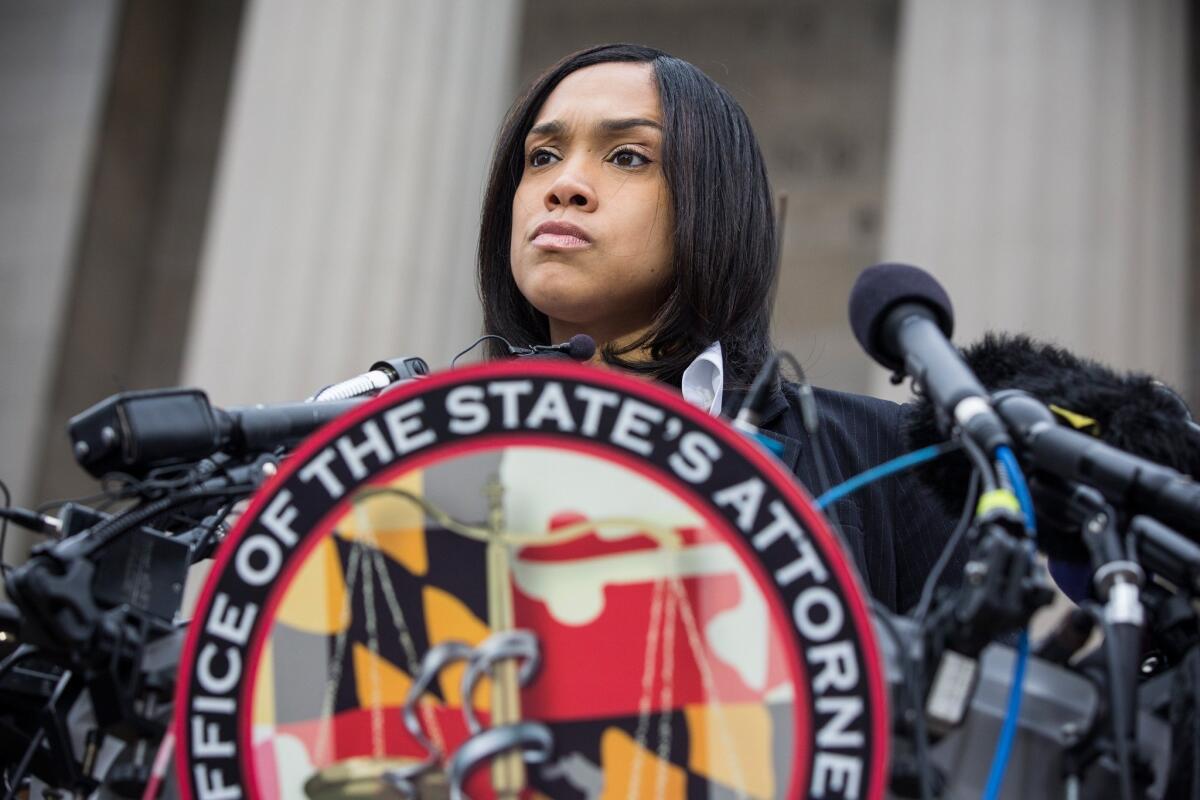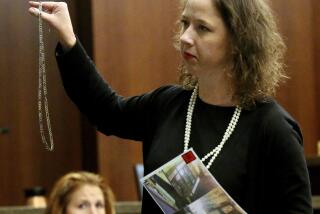To win convictions, prosecutors must get inside heads of Baltimore officers

- Share via
Prosecutors seeking to convict six Baltimore officers in the death of a young black man severely injured while in police custody will focus not on what the officers did but on what they allegedly failed to do: provide medical attention to 25-year-old Freddie Gray inside a police van on April 12.
That will require prosecutors and jurors to get inside the heads of the officers to determine whether they willfully ignored what a prosecutor said was Gray’s increasingly frantic pleas for medical help during a 44-minute ride in the van.
Unlike police abuse cases in which officers are charged with a physical act, such as beating or shooting a suspect, the Gray case involves evaluating the subjective performance of police duties. Prosecutors will have to convince jurors that the officers showed a conscious disregard for human life, said Laurie Levenson, a former federal prosecutor.
“It’s not enough to show officers were bad officers, bad policing,’’ said Levenson, a Loyola Law School professor. “You’re not in the officer’s head. Even if they are wrong, even if they made a mistake, it doesn’t make it criminal.’’
The most serious charge, against the driver of the van, Officer Ceasar Goodson, is second-degree “depraved heart’’ murder, which involves a special degree of reckless indifference. But proving that charge beyond a reasonable doubt is a significant challenge, according to defense lawyers and former prosecutors.
They said it will also be difficult to persuade jurors to vote guilty on other serious charges against the officers, including manslaughter and assault.
“Jurors just don’t want to believe these are the bad guys,’’ Levenson said. “It’s almost too scary to think that we’ve given criminals the power of law enforcement. The burden of proof is so high because police officers come in with what I call an extra presumption of innocence.’’
Whether the officers recognized Gray’s medical condition “will be the million-dollar question,’’ said John A. Wilson, a retired FBI agent and use-of-force consultant who has testified as an expert witness in police brutality cases. Unless prosecutors can show the officers were fully aware of how their actions — or inactions — affected Gray’s condition, jurors are likely to side with the cops, he said.
Baltimore State’s Atty. Marilyn J. Mosby said Friday that Gray “suffered a critical neck injury as a result of being handcuffed, shackled by his feet and restrained’’ inside the police van.
Mosby accused Goodson, the driver, of ignoring Gray’s pleas for medical assistance “in a grossly negligent manner.’’ She said Sgt. Alicia D. White, who is charged with manslaughter, assault and misconduct, “made no effort to look, or assess, or determine his condition.’’
To refute those allegations, defense lawyers will probably ask jurors to view the events of April 12 from the point of view of officers confronted with a difficult and rapidly evolving situation. For instance, Wilson said, officers often deal with suspects who claim to be in pain. Determining which complaints are legitimate could be viewed by jurors as the purview of a doctor, not a police officer.
John D. Barnett, an Orange County defense attorney who has represented police officers in excessive-force cases, said defense lawyers should request every scrap of communication between the officers and dispatchers, between officers and paramedics, and among the officers’ themselves in order to establish the officers’ states of mind.
“You want to have all those voices so you know what’s in the head of each of the officers,’’ Barnett said. “You view the information that is available from the view of a peace officer, not a plumber or a pastor. They look at things differently because their experiences are different.’’
Barnett, who represented an officer involved in the Rodney King beating in Los Angeles in 1991, said prosecutions of law enforcement officers are frequently unsuccessful because charges are hastily filed without a thorough investigation, for political of public relations reasons.
“When there’s been rioting or demonstrations, the decision to indict is not based on the evidence of whether they can get a conviction, but for political concerns,’’ Barnett said. “The expectations are raised by these quick indictments. Later on, the officers are acquitted [and] the public doesn’t understand why.’’
Mosby brought the charges against the six officers just one day after receiving a report on the police investigation of Gray’s death and just hours after a medical examiner ruled the April 19 death a homicide. Critics said she was attempting to tamp down rising public indignation that spilled over into a night of violence, looting and arson on Monday.
“It’s pretty disconcerting what she is doing, bringing charges after having the case just one day,’’ said former federal prosecutor Steven H. Levin of Baltimore.
Mosby said her office had conducted a “comprehensive, thorough and independent investigation.’’
More than three months passed from the Aug. 9 shooting death of Michael Brown in Ferguson, Mo., before a prosecutor announced on Nov. 24, that a grand jury decided not to indict officer Darren Wilson. Nearly five months elapsed after Eric Garner died during a police arrest in Staten Island before a grand jury declined to indict the officers involved.
Rochelle Ritchie, a spokeswoman for Mosby, said prosecutors have 30 days from the filing of the charges to seek an indictment from a grand jury. Preliminary hearings for the officers are scheduled for May 27.
The Baltimore chapter of the Fraternal Order of Police has accused Mobsy of “an egregious rush to judgment.’’
Early defense comments appeared to portray the officers as dedicated public servants performing a thankless job. Michael E. Davey, a police union lawyer, said Friday, “We believe that these officers will be vindicated, as they have done nothing wrong.’’
In a letter sent to Mosby before the charges were announced, union President Gene Ryan wrote, “At all times, each of the officers diligently balanced their obligations to protect Mr. Gray and discharge their duties to protect the public.’’
Ryan alluded to the officers’ state of mind, adding, “Not one of the officers involved in this tragic situation left home in the morning with the anticipation that someone with whom they interacted would not go home that night.’’
Erwin Chemerinsky, dean of the law school at UC Irvine and an expert on civil rights law, said charges against the six officers may represent a shift in official and public opinion about prosecuting police officers in the wake of recent, highly publicized deaths of unarmed black man at the hands of police.
“Would these officers have been indicted if not for Ferguson and Staten Island?’’ Chemerinsky asked. “The enormous publicity surrounding the deaths of African American men in the hands of police really could make a difference at trial.’’
Also significant in the Gray prosecution are the lesser charges: misconduct in office and false imprisonment. Mosby said officers did not have probable cause to to arrest Gray. She said a knife found in Gray’s clothing was a legal pocketknife and not an illegal switchblade, as police had claimed. Gray had not committed a crime when he was arrested and was handcuffed after he had made eye contact with an officer and fled, Mosby said. She also said the officers had failed to secure Gray with a seat belt inside the van, in violation of police policy.
The lesser charges give jurors a fallback option, Levenson said.
“It gives jurors room to compromise,’’ she said. “It can better tailor the case to the individual actions of the individual officers.’’
Zucchino reported Durham, N.C., and Kim from Los Angeles. Times staff writer Tim Phelps in Baltimore contributed to this report.
More to Read
Sign up for Essential California
The most important California stories and recommendations in your inbox every morning.
You may occasionally receive promotional content from the Los Angeles Times.















